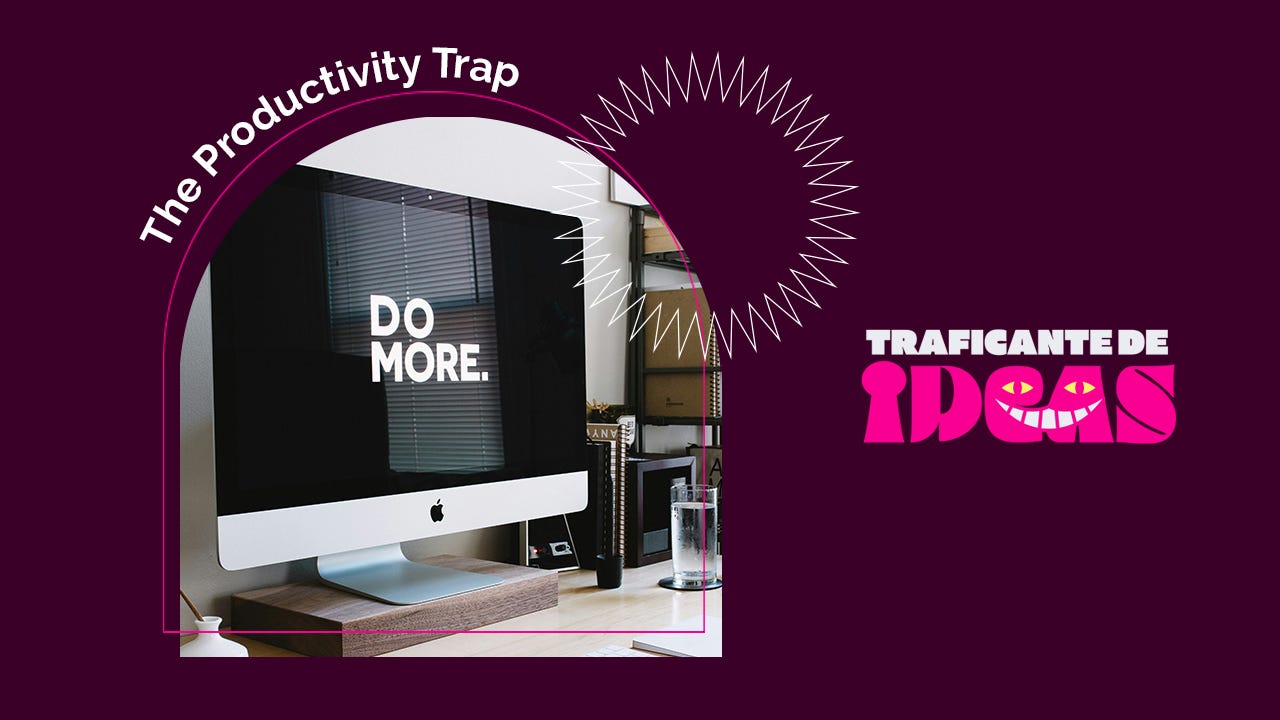The Productivity Trap:
How Technology Has Enslaved Us in an Unrelenting Pursuit of Efficiency
The promise of technology has always been to liberate us, to give us more time to dedicate to what truly matters (to us). From the earliest industrial machines to contemporary smart devices, the narrative has remained constant: technology will make us more productive, allowing us to do more in less time and, consequently, enjoy more free time. However, reality has shown otherwise: instead of liberating us, technology has reinforced our slavery to productivity, conditioning our lives and our perception of time in an insidious and often invisible manner.
The myth of productivity, as described by Erik Salvaggio, has infiltrated our lives to the point where efficiency has become an end in itself. This myth suggests that everything we do must be optimized, that any activity can be automated, and therefore, the time spent on those activities should be freed up for other tasks, which can, in turn, be automated as well. Under this paradigm, the value of a task does not lie in the process, reflection, or personal growth it might provide, but in the amount of time that can be saved by doing it.
It is important to understand that this mentality is not simply a consequence of technology but arises from an ideology deeply rooted in capitalism. Capitalism demands the constant production of goods and services, and in this context, efficiency becomes a supreme virtue. However, this efficiency is not oriented toward personal fulfillment or social well-being but toward the maximization of economic productivity. In other words, workers are expected to produce more in less time, in order to generate greater profits for those who control the means of production.
In turn, this focus on productivity has given rise to a form of alienated labor, where workers are reduced to mere cogs in the economic machine. Technology, rather than empowering workers, has often been used to reinforce this alienation. Technological tools are not necessarily designed to improve the quality of work or to facilitate a deeper sense of purpose; instead, they are designed to maximize efficiency and, consequently, profits. As a result, workers find themselves in an endless cycle of production, where the goal is to do more in less time, without pausing to reflect on the intrinsic value of what they are doing.
Writing and research, which are intrinsically reflective and creative activities, are not exempt from this dynamic. The myth of productivity suggests that the most important thing is to fill pages, that the essence lies in the final product and not in the thought process that leads to the creation of a complete page. This approach reduces the act of writing to a mechanical task, stripping it of its value as an exercise in critical thinking and creativity.
Ted Chiang, in his critique of generative technology, argues that the true value of writing, art, education, and thought in general, lies in intentionality, in the ability to confront a subjectivity and extract from it a meaning that enriches our own life experience. Technology, however, seems designed to eradicate this intentionality, replacing it with a hollow, dehumanizing efficiency.
Generative technology, like ChatGPT, presents itself as a tool that can facilitate intellectual work, but in reality, what it offers is a shortcut that avoids the effort necessary for true understanding. Using these tools to complete tasks without reflection is like using an advanced calculator to solve mathematical problems without learning the basics of arithmetic: it may provide a quick answer, but it does not help develop the fundamental skills necessary to understand the process. This type of technology reinforces the idea that critical thinking and research are barriers that must be eliminated to reach a solution, rather than being considered the essential foundations of true knowledge.
What I mean by this is that the ideology of productivity is not simply a matter of time optimization; it reflects a worldview that values abstract, alienated labor over meaningful, reflective work. In this sense, technology is not neutral; it is an instrument that, in the hands of capitalism, reinforces and perpetuates this worldview.
One of the great dangers of this ideology is that it dehumanizes workers, transforming them into mere producers of goods and services. Creativity, reflection, learning, and personal growth are seen as inefficient and are therefore marginalized or completely eliminated from the production process. Technology, instead of being a means to liberate human creativity, becomes a tool to restrict and control it.
The result is a society where productivity has become a form of control, a tool to keep workers subjugated and alienated from their own work. Instead of using technology to improve the quality of our lives, we have allowed it to infiltrate every aspect of our existence, dictating how we work, think, and live.
This way of viewing and living productivity not only affects workers but also has a profound impact on education, art, and culture. Instead of fostering creativity and critical thinking, modern education often focuses on acquiring skills that are perceived as useful in a job market dominated by efficiency and productivity. Art becomes a commodity, valued not for its ability to inspire or provoke reflection, but for its ability to generate economic profit. Culture is transformed into just another product, a consumer good that must be produced and distributed in the most efficient way possible.
With all this, a couple of questions arise:
How can we balance the use of technology to improve efficiency without sacrificing the development of critical thinking and creativity in the process?
How is the ideology of technological productivity shaping our perceptions of the value of work, and how can we challenge this narrative to promote a more humane and meaningful approach to our daily activities?


